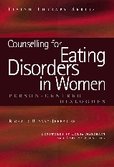Richard Bryant-Jefferies
Counselling, Psychotherapy and Coaching Author, Consultant in Equalities and Diversity, Counselling and Self-Awareness Trainer
COUNSELLING FOR EATING DISORDERS IN WOMEN: person-centred dialogues
Richard Bryant-Jefferies
ISBN 1 85775 776 9
The author writes: 'People eat particular foods, or avoid eating for many reasons, and to the person themselves these can seem quite normal and reasonable. Even the individual who is starving themselves is doing so for a reason, however misguided that reasoning may seem to someone outside of their skin. But it is a behaviour and often an attempt, by that person, to achieve something that they desperately need. The difficulty is that so often their striving to control diet, their weight, size or shape, itself gets out of control, at which point it might be seen to become ‘problematic’.
An eating disorder is an outer and visible sign of an inner condition. Unless that inner state is addressed, outer change is less likely to be sustainable. On this basis, the ‘eating disorder’ is secondary to the inner, psychological process that drives the behaviour. Should we therefore develop a different language that affirms this?
Perhaps we might introduce the word ‘problematic’ into the vocabulary when we think of eating disorders, talking instead of ‘problematic or problem eating’. The term ‘eating disorder’ is now largely associated in peoples minds with females. A new language might help to widen the association in people’s minds of this set of conditions to include both genders.
There is a further issue concerning language. The term ‘eating disorder’ can also be regarded as pathologising a particular behaviour, and causing the actual and unique underlying cause for a particular person to become lost in generalisations that are more to do with symptomatic effects and behaviours than psychological causation. An eating disorder is, surely, a specific eating-related behaviour that has meaning for a particular person as a result of their psychological state.'
'The strengths of this book are in my opinion two-fold; the ease with which Richard is able to demonstrate how the theory of the person-centred approach can aid our understanding of a client with an eating disorder and how he can explain the potential process of change for someone with an eating disorder; secondly, I have been impressed by the depth of relationship that Richard is able to convey through the different sessions, even though the sessions themselves are fictitious, which felt powerful enough for the reader to be able to enter the experience as a ‘fly on the wall’ and very swiftly have an experiential understanding of the session.
This I believe also means that the book will lend itself not only to counsellors and students of counselling but to other professionals of whom there are often many involved in the care of clients who have an eating disorder. Richard demonstrates a capacity to enter the world of clients who have an eating disorder in a very powerful and creative way, his words at times have moved me especially at those points where he illuminated an aspect of the work that I feel is crucial for clients such as these, for example the struggle to know they exist. This is a beautifully crafted and thought provoking book – a real gift. '
Lorna Marchant, Senior Lecturer, University of Brighton. Counsellor, supervisor, trainer and consultant
Purchase direct from the author (see contact details), from the publisher - Routledge, or all on-line booksellers.
Books published
Counselling the Person Beyond the Alcohol Problem
Living Therapy series
Problem Drinking
Couselling for Problem Gambling
Counselling for Eating Disorders in Women
Counselling for Eating Disorders in Men
Counselling Young People
Relationship Counselling: Sons and their Mothers
Responding to a Serious Mental Health Problem
Counselling for Progressive Disability
Counselling a Recovering Drug User
Counselling a Survivor of Childood Sexual Abuse
Counselling Victions of Warfare
Counselling for Obesity
Counselling Young Binge Drinkers
Counselling for Death and Dying
Time-limited Therapy in Primary Care
Workplace Counselling in the NHS
Person-centred Counselling Supervision
Models of Care for Drug Service Provision
A Little Book of Therapy
Novels
Binge!
Alive and Cutting
The Jigsaw of Life
The Sevenfold Circle: Self Awareness in Dance (with Lynn Frances)
